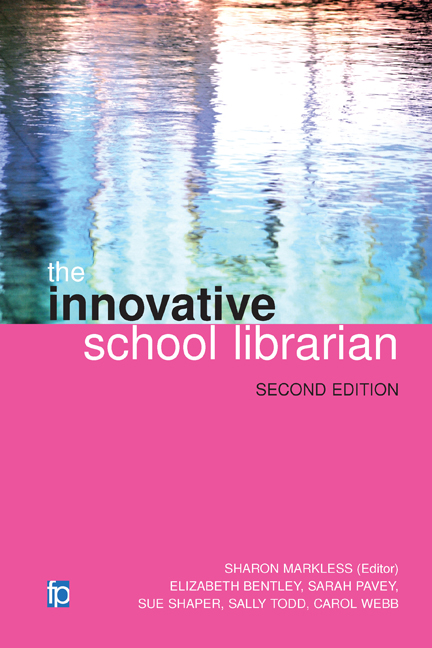Book contents
- Frontmatter
- Contents
- Preface
- Acknowledgements
- PART 1 WHO IS THE LIBRARIAN?
- 1 Professionalism and the school librarian
- 2 How others see us
- 3 Bridging the gap between how we see ourselves and how others see us
- PART 2 YOUR COMMUNITY: FROM PERCEPTIONS TO PRACTICE
- PART 3 MOVING FORWARD
- Appendix 1 Levels of education
- Appendix 2 School library self-evaluation questions
- Appendix 3 An example of a completed self-evaluation summary sheet
- Appendix 4 SWOT analysis
- Appendix 5 Choosing priorities in development planning: sample grid
- Appendix 6 Example of a force field analysis: a tool for managing change
- Appendix 7 Managing change: process and principles
- References
- Index
2 - How others see us
from PART 1 - WHO IS THE LIBRARIAN?
Published online by Cambridge University Press: 08 June 2018
- Frontmatter
- Contents
- Preface
- Acknowledgements
- PART 1 WHO IS THE LIBRARIAN?
- 1 Professionalism and the school librarian
- 2 How others see us
- 3 Bridging the gap between how we see ourselves and how others see us
- PART 2 YOUR COMMUNITY: FROM PERCEPTIONS TO PRACTICE
- PART 3 MOVING FORWARD
- Appendix 1 Levels of education
- Appendix 2 School library self-evaluation questions
- Appendix 3 An example of a completed self-evaluation summary sheet
- Appendix 4 SWOT analysis
- Appendix 5 Choosing priorities in development planning: sample grid
- Appendix 6 Example of a force field analysis: a tool for managing change
- Appendix 7 Managing change: process and principles
- References
- Index
Summary
Regardless of how we view ourselves as professionals, we work within the context of other people's perceptions of us and demands on us. While the library may be referred to by some (e.g. Libraries All Party Parliamentary Group, 2014) as the ‘heart of the school’ this does not mean that it is always, in practice, central to school life. Indeed, some people may see the librarian as peripheral to the teaching and learning ‘business’ of the school. Even where the library is positioned physically at the middle or the front of the school building, as is certainly the case in some schools, we need to recognize that this is only part of what being central means. Far more important is the library's relationship to the curriculum and the extent to which the librarian is included in the planning and delivery of teaching and learning in all its manifestations. In this chapter we will discuss how different groups regard this relationship and the effect this has on what the librarian can achieve.
People within the school community
Head teachers
Head teachers determine how the school's resources are to be distributed, subject only to the governors’ approval, and their vision of education has an enormous impact on our role. Ofsted (2006) underlined the importance of head teachers in setting the school library context:
Leadership by supportive and knowledgeable headteachers and senior managers was the most important factor in improving library provision. They recognized how libraries contributed to learning and, wherever possible, they appointed specialist librarians to lead developments.
Overwhelmingly, the most significant element in bringing about improvements was the commitment and support of effective head teachers.
A survey of head teachers’ attitudes to the school library, commissioned by the UK All Party Parliamentary Group for Libraries, published in 2014, found that well over 90% of those who responded valued their school libraries. Given this enthusiasm, why do so many schools not have a professionally staffed school library? Lack of head teacher support may not be the only reason, but given how crucial this support is for the development of an effective school library there are obviously many who remain unconvinced about the school library's contribution to student learning and do not support it.
- Type
- Chapter
- Information
- The Innovative School Librarian , pp. 23 - 38Publisher: FacetPrint publication year: 2016
- 1
- Cited by



